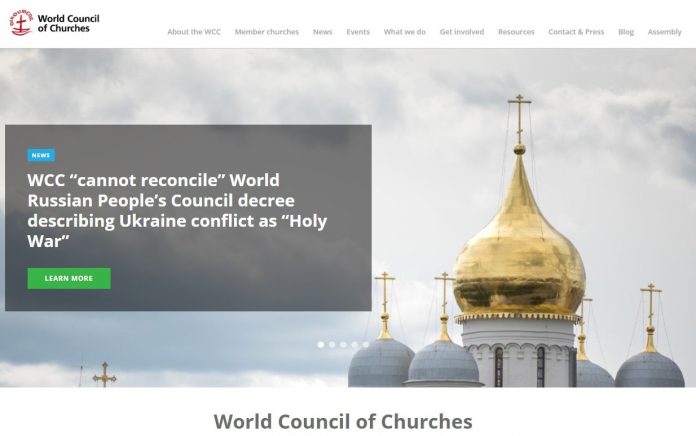Φως Φαναρίου
Ο Γενικός Γραμματέας του Παγκοσμίου Συμβουλίου Εκκλησιών Rev. Prof. Dr Jerry Pillay, απηύθυνε επιστολή προς τον Πατριάρχη Μόσχας Κύριλλο, στην οποία – μεταξύ άλλων – αναφέρονται οι ακόλουθοι προβληματισμοί:
Στις 27 Μαρτίου 2024, υπό την προεδρία του αρχηγού της Ρωσικής Ορθόδοξης Εκκλησίας, Πατριάρχη Κύριλλου, εγκρίθηκε το Διάταγμα του Παγκόσμιου Ρωσικού Λαϊκού Συμβουλίου για «Το παρόν και το μέλλον του ρωσικού κόσμου». Το διάταγμα, το οποίο απευθύνεται στις νομοθετικές και εκτελεστικές αρχές της Ρωσίας, έχει προκαλέσει σοβαρές ανησυχίες στα μέλη του Παγκόσμιου Συμβουλίου Εκκλησιών.
Μεταξύ άλλων προβληματισμών που προκύπτουν από το πρόσφατο Διάταγμα, το Παγκόσμιο Συμβούλιο Εκκλησιών δεν μπορεί να συμβιβάσει τη δήλωση ότι «η ειδική στρατιωτική επιχείρηση [στην Ουκρανία] είναι Ιερός Πόλεμος» με όσα άκουσε ο Γ. Γραμματέας του ΠΣΕ απευθείας από τον ίδιο τον Πατριάρχη Κύριλλο, ούτε με το σχετικό διοικητικό όργανο του ΠΣΕ για πολιτικές εξαγγελίες, ούτε, προφανώς, με τη βιβλική έκκληση προς τους Χριστιανούς να είναι ειρηνοποιοί εν μέσω σύγκρουσης.
Σε μια συνάντηση με τον Γενικό Γραμματέα του ΠΣΕ, στη Μόσχα τον Μάιο του 2023, ο Πατριάρχης Κύριλλος είπε ότι όποιες αναφορές είχε κάνει στον «Ιερό Πόλεμο» στο τρέχον πλαίσιο σχετίζονται με το μεταφυσικό πεδίο, όχι με την ένοπλη σύγκρουση στην Ουκρανία. Πράγματι, συμφώνησε με τον Γενικό Γραμματέα του ΠΣΕ ότι κανένας πόλεμος ένοπλης βίας δεν μπορεί να είναι «ιερός». Το διάταγμα που ενέκρινε, όμως, έρχεται σε αντίθεση με αυτή τη θέση.
Το ΠΣΕ δεν μπορεί να αποδεχθεί την θέση του Διατάγματος της παράνομης και αδικαιολόγητης εισβολής της Ρωσίας στην κυρίαρχη γειτονική της Ουκρανία ως «ένα νέο στάδιο του εθνικοαπελευθερωτικού αγώνα του ρωσικού λαού ενάντια στο εγκληματικό καθεστώς του Κιέβου και την συλλογική Δύση πίσω της, που διεξάγεται στα εδάφη της Νοτιοδυτικής Ρωσίας από το 2014», ή την προοπτική ότι «όλο το έδαφος της σύγχρονης Ουκρανίας πρέπει να εισέλθει σε μια ζώνη αποκλειστικής επιρροής της Ρωσίας».
Ως εκ τούτου ζητήθηκε μια επείγουσα συνάντηση για να συζητηθεί αυτό το θέμα και κυρίως η διγλωσσία της Ρωσικής Εκκλησίας προς το Παγκόσμιο Συμβούλιο Εκκλησιών, το οποίο δεν μπορεί να δεχθεί τις θέσεις της Μόσχας.
Παραθέτουμε στη συνέχεια το σχετικό κείμενο στα αγγλικά.
WCC statement on Decree of XXV World Russian People’s Council
World Council of Churches (WCC) general secretary Rev. Prof. Dr Jerry Pillay, on behalf of WCC member churches, said that the WCC cannot reconcile the Decree of the XXV World Russian People’s Council describing the conflict in Ukraine as a “Holy War.”
On 27 March 2024, under the chairmanship of the head of the Russian Orthodox Church His Holiness Patriarch Kirill, the Decree of the XXV World Russian People’s Council “The Present and Future of the Russian World” (Moscow, November 27-28, 2023) was approved. The decree, which is addressed to the legislative and executive authorities of Russia, has raised grave concerns among members of the World Council of Churches.
The World Russian People’s Council is the largest Russian public forum, and according to its Statutes, the head of the Council is the Patriarch of Moscow and All Russia, under whose presidency the annual Council meetings are held.
Among other concerns arising from the recent Decree, the World Council of Churches cannot reconcile the statement that “the special military operation [in Ukraine] is a Holy War” with what we have heard directly from Patriarch Kirill himself, nor with relevant WCC governing body policy pronouncements, nor indeed with the biblical calling for Christians to be peacemakers in the midst of conflict.
In a meeting with the WCC general secretary, the Rev Prof Dr Jerry Pillay, in Moscow in May 2023, Patriarch Kirill said that any references he had made to ‘Holy War’ in the current context were related to the metaphysical realm, not to the physical armed conflict in Ukraine. Indeed, he agreed with the WCC general secretary that no war of armed violence can be ‘holy’. The Decree contradicts this position.
Moreover, since the Russian invasion of Ukraine in February 2022, WCC’s highest governing bodies – the Central Committee in June 2022, and the 11th Assembly in September 2022 – have strongly affirmed the position that “war is incompatible with God’s very nature and will for humanity and against our fundamental Christian and ecumenical principles”. They explicitly denounced the invasion of Ukraine as “illegal and unjustifiable”. In addition, they rejected “any misuse of religious language and authority to justify armed aggression and hatred”. The Russian Orthodox Church was represented in both of these key governing body meetings and in the processes leading to the adoption of these statements.
In light of the established positions of WCC’s highest governing bodies, the WCC cannot accept the Decree’s presentation of Russia’s illegal and unjustifiable invasion of its sovereign neighbour Ukraine as “a new stage of the national liberation struggle of the Russian people against the criminal Kiev regime and the collective West behind it, conducted in the lands of South-Western Russia since 2014”, or the perspective that “all territory of modern Ukraine should enter into a zone of exclusive influence of Russia”.
Consequently, the WCC general secretary has written to Patriarch Kirill seeking clarifications on whether this Decree should be understood as expressing the Russian Orthodox Church’s own position, how such positions can be held by a member church of the World Council of Churches, and how they can be squared with what we have heard directly from the Patriarch himself. An urgent meeting has been requested to discuss this matter and to find ways in which the concerns raised within the fellowship can be addressed.
Rev. Prof. Dr Jerry Pillay
General Secretary
World Council of Churches

